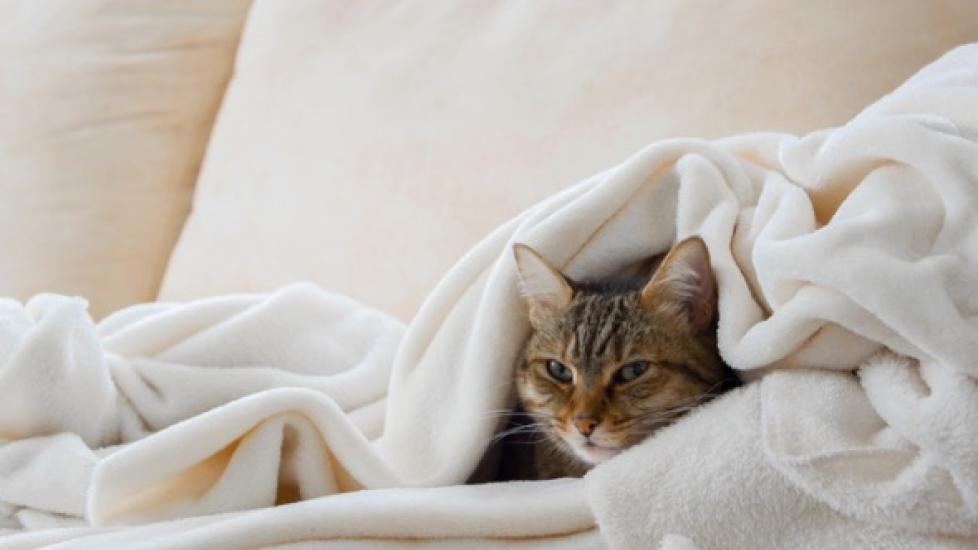Cat Colds
What Are Cat Colds?
A “cat cold” is a general term that refers to a group of symptoms in cats. It is similar to the common cold in humans and usually caused by a virus that affects felines.
Symptoms of Cat Colds
Cats with colds may have symptoms including coughing, sneezing, discharge from the eyes or nose, lethargy, and sometimes fever. For many cats, these symptoms are will go away on their own in about 7-10 days.
However, some cats may experience complications, such as a secondary bacterial infection or pneumonia. This can cause yellow-green discharge from the eyes or nose, which may lead to congestion severe enough that your cat can’t smell or taste. Cats with this condition may refuse to eat.
Causes of Cat Colds
The most common causes of cat colds are viral infections. It is estimated that about 90% are caused by the feline herpesvirus and feline calicivirus.
Feline Herpesvirus
Feline herpesvirus (or feline rhinotracheitis virus) is extremely contagious. It is commonly seen in situations where multiple cats are housed together (such as a rescue or shelter).
Similar to herpesviral infections in humans, cats infected with the herpes virus will carry it for the rest of their lives. Many cats will experience dormant periods where the virus is not actively reproducing. They may look perfectly healthy during dormant periods. However, after stressful events that suppress the immune system, such as being boarded or groomed, the virus may become active and cause symptoms including sneezing or runny eyes for a few days.
Feline Calicivirus
Cats that are infected with feline calicivirus may show very similar signs to cats that are infected with feline herpesvirus. Also like herpesvirus, calicivirus is highly contagious.
Fortunately, both viral infections are specific to cats and are not contagious to people. Additionally, there are vaccines for both viruses, and these viruses are considered core vaccines for kittens and adult cats. Although the vaccine may not prevent infection completely, it can help to reduce symptoms and prevent serious disease.
How Vets Diagnose Cat Colds
If your cat is showing symptoms of a viral infection, your cat’s veterinarian will perform a thorough examination. It is important that you give your vet a thorough medical history about your cat, including the onset and nature of the symptoms.
Based on their exam findings, your cat’s veterinarian may recommend routine diagnostic tests to check for possible complications of a cold. These tests may include a complete blood count (CBC) to check white and red blood cell and platelet counts, a serum biochemistry to see if the internal organs are functioning appropriately, and chest X-rays to check for pneumonia or other conditions such as asthma or fungal infection.
An upper respiratory PCR panel may be recommended by your cat’s veterinarian in order to figure out what virus or bacteria is causing her symptoms. This test is performed by collecting secretions from the eyes and nose with swabs and submitting them to a laboratory, where they are analyzed for pathogens that cause respiratory disease.
Treatment for Cat Colds
Mild cases typically do not require any medical treatment, but there are some things that you can do at home to help your cat feel better while she is recovering:
-
Keep your cat with you in the bathroom while you take a hot shower. The humidity can help relieve nasal congestion.
-
If the air in your home is dry (during winter for example), use a humidifier to help relieve airway irritation.
-
Reduce your cat’s stress during recovery. This may mean keeping her confined to a smaller, quiet room with all of her essentials close by (litter box, food, water, and warm bed) and using pheromone products.
Severe cases, or cases where a secondary bacterial infection is also present, often require antibiotics. Typically, this will be in the form of oral medication that is administered at home. If your cat is sick enough that she is having difficulties breathing or refusing to eat, she may require hospitalization for 1-2 days until she is stable enough to continue treatment at home.
Recovery and Management of Cat Colds
Most healthy cats are able to make a full recovery from a cat cold without medical intervention in about 7-10 days. If your cat experiences more severe symptoms and medical treatment is required, the recovery period may last longer and be harder, depending on how serious it was. Adding in at-home care (such as steam therapy with a shower, a humidifier, and reducing stress) can help with a cat’s recovery.
Cat Colds FAQs
How can I treat my cat's cold at home?
As long as your cat is still able to perform her essential daily functions (eat, drink, urinate, and defecate normally) then you can help her recover by using steam therapy from a hot shower, adding a humidifier if your air is dry, and reducing stress at home.
How do indoor cats get colds?
Most cats are exposed to the feline herpesvirus or feline calicivirus when they are very young or by being housed in a shelter with other cats. Both viruses will stay in a cat’s system for life after they are exposed, meaning that the majority of the time cats will appear healthy but may start to show symptoms of a cold after times of stress.
Do cats get cold easily?
Yes, most cat colds are caused by the feline herpesvirus and feline calicivirus. Both are very contagious and easily transmitted between cats.
Does lysine help cats with colds?
Lysine may reduce the severity of the symptoms a cat experiences due to the herpesvirus by interfering with viral replication.
Help us make PetMD better
Was this article helpful?
